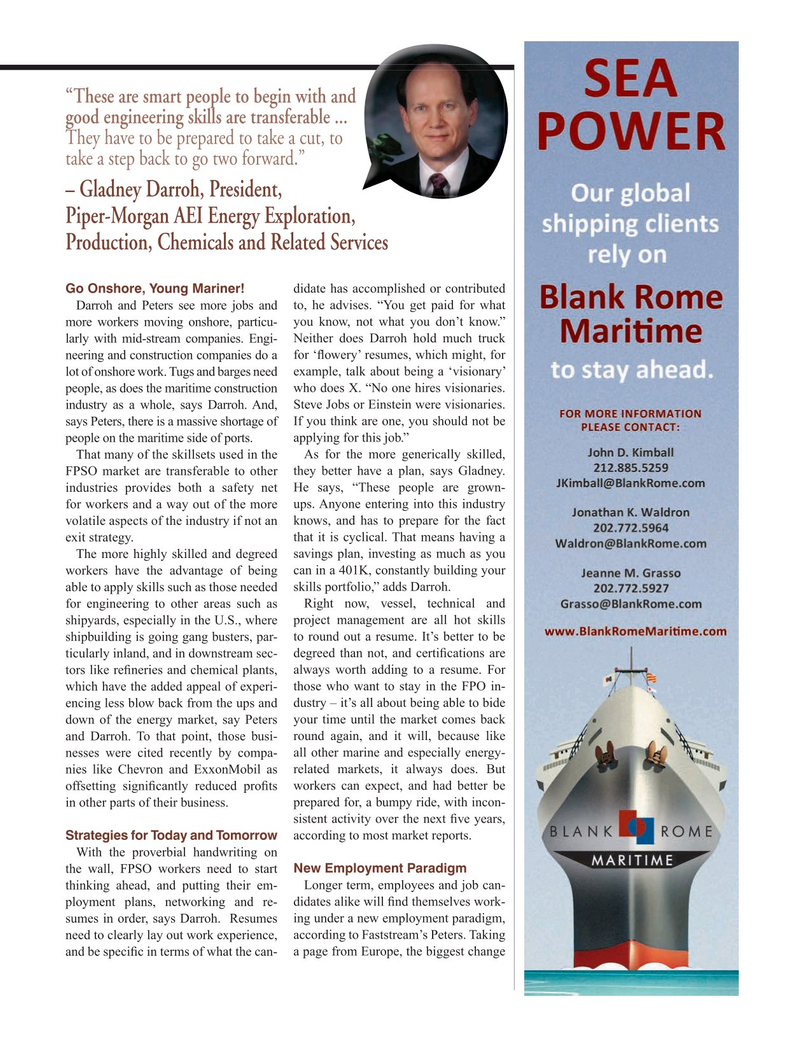
Page 43: of Maritime Logistics Professional Magazine (Q4 2015)
Read this page in Pdf, Flash or Html5 edition of Q4 2015 Maritime Logistics Professional Magazine
“These are smart people to begin with and good engineering skills are transferable ...
They have to be prepared to take a cut, to take a step back to go two forward.” – Gladney Darroh, President,
Piper-Morgan AEI Energy Exploration,
Production, Chemicals and Related Services
Go Onshore, Young Mariner! didate has accomplished or contributed
Darroh and Peters see more jobs and to, he advises. “You get paid for what more workers moving onshore, particu- you know, not what you don’t know.” larly with mid-stream companies. Engi- Neither does Darroh hold much truck neering and construction companies do a for ‘? owery’ resumes, which might, for lot of onshore work. Tugs and barges need example, talk about being a ‘visionary’ people, as does the maritime construction who does X. “No one hires visionaries. industry as a whole, says Darroh. And, Steve Jobs or Einstein were visionaries. says Peters, there is a massive shortage of If you think are one, you should not be people on the maritime side of ports. applying for this job.”
That many of the skillsets used in the As for the more generically skilled,
FPSO market are transferable to other they better have a plan, says Gladney. industries provides both a safety net He says, “These people are grown- for workers and a way out of the more ups. Anyone entering into this industry volatile aspects of the industry if not an knows, and has to prepare for the fact exit strategy. that it is cyclical. That means having a
The more highly skilled and degreed savings plan, investing as much as you workers have the advantage of being can in a 401K, constantly building your able to apply skills such as those needed skills portfolio,” adds Darroh. for engineering to other areas such as Right now, vessel, technical and shipyards, especially in the U.S., where project management are all hot skills shipbuilding is going gang busters, par- to round out a resume. It’s better to be ticularly inland, and in downstream sec- degreed than not, and certi? cations are tors like re? neries and chemical plants, always worth adding to a resume. For which have the added appeal of experi- those who want to stay in the FPO in- encing less blow back from the ups and dustry – it’s all about being able to bide down of the energy market, say Peters your time until the market comes back and Darroh. To that point, those busi- round again, and it will, because like nesses were cited recently by compa- all other marine and especially energy- nies like Chevron and ExxonMobil as related markets, it always does. But offsetting signi? cantly reduced pro? ts workers can expect, and had better be in other parts of their business. prepared for, a bumpy ride, with incon- sistent activity over the next ? ve years,
Strategies for Today and Tomorrow according to most market reports.
With the proverbial handwriting on the wall, FPSO workers need to start New Employment Paradigm thinking ahead, and putting their em- Longer term, employees and job can- ployment plans, networking and re- didates alike will ? nd themselves work- sumes in order, says Darroh. Resumes ing under a new employment paradigm, need to clearly lay out work experience, according to Faststream’s Peters. Taking and be speci? c in terms of what the can- a page from Europe, the biggest change 34-49 Q4 MP2015.indd 43 11/18/2015 9:44:22 AM

 42
42

 44
44
